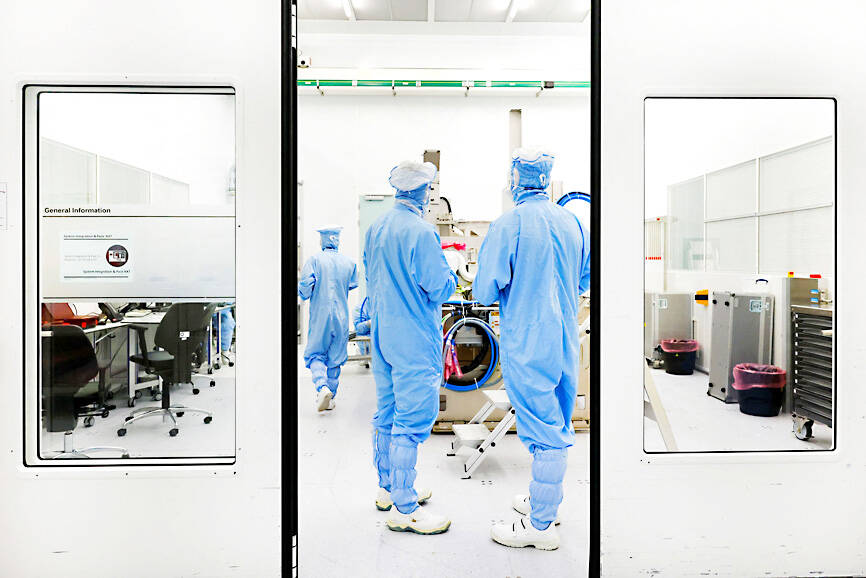ASML Holding NV said it started shipping major parts of the first of its newest chipmaking machine to Intel Corp.
The state-of-the-art system, called “high-NA extreme ultraviolet,” was shipped to Intel’s D1X factory in Oregon, said people familiar with the matter, speaking on condition of anonymity. Intel and ASML spokespeople did not comment on the system’s destination.
The technology has huge significance for both companies, which are among the most important in the semiconductor business. Intel CEO Pat Gelsinger promised his company would receive the first of this new type of machine, showing his commitment to returning to the forefront of manufacturing technology. ASML, for its part, is rolling out the new technique with the goal of keeping the chip industry dependent on its gear.

Photo: Reuters
Intel plans to begin production with the system in 2025, ASML said in a statement last year. D1X is a facility where Intel develops and perfects future production techniques.
ASML is the world’s top maker of lithography systems, machines that perform a crucial step in the process of creating semiconductors. It is the only producer of extreme ultraviolet lithography machines used by Taiwan Semiconductor Manufacturing Co (TSMC, 台積電), Samsung Electronics Co and Intel for the most advanced fabrication.
“We’re excited and proud to ship our first high NA EUV system to Intel,” ASML said on Thursday in a post on X, formerly Twitter.
The first model of ASML’s high-NA extreme ultraviolet lithography machine — the Twinscan EXE:5200 — is to be priced at about 250 million euros (US$275.03 million), Oddo BHF analysts said in a note earlier this month.
The second generation of the high-NA EUV machine, dubbed EXE:5200B, is to have higher productivity and a price tag of more than 350 million euros, the analysts said after a meeting with the company.
ASML charges about US$180 million for its top-end machines.

Hon Hai Precision Industry Co (鴻海精密) yesterday said that its research institute has launched its first advanced artificial intelligence (AI) large language model (LLM) using traditional Chinese, with technology assistance from Nvidia Corp. Hon Hai, also known as Foxconn Technology Group (富士康科技集團), said the LLM, FoxBrain, is expected to improve its data analysis capabilities for smart manufacturing, and electric vehicle and smart city development. An LLM is a type of AI trained on vast amounts of text data and uses deep learning techniques, particularly neural networks, to process and generate language. They are essential for building and improving AI-powered servers. Nvidia provided assistance

GREAT SUCCESS: Republican Senator Todd Young expressed surprise at Trump’s comments and said he expects the administration to keep the program running US lawmakers who helped secure billions of dollars in subsidies for domestic semiconductor manufacturing rejected US President Donald Trump’s call to revoke the 2022 CHIPS and Science Act, signaling that any repeal effort in the US Congress would fall short. US Senate Minority Leader Chuck Schumer, who negotiated the law, on Wednesday said that Trump’s demand would fail, while a top Republican proponent, US Senator Todd Young, expressed surprise at the president’s comments and said he expects the administration to keep the program running. The CHIPS Act is “essential for America leading the world in tech, leading the world in AI [artificial

DOMESTIC SUPPLY: The probe comes as Donald Trump has called for the repeal of the US$52.7 billion CHIPS and Science Act, which the US Congress passed in 2022 The Office of the US Trade Representative is to hold a hearing tomorrow into older Chinese-made “legacy” semiconductors that could heap more US tariffs on chips from China that power everyday goods from cars to washing machines to telecoms equipment. The probe, which began during former US president Joe Biden’s tenure in December last year, aims to protect US and other semiconductor producers from China’s massive state-driven buildup of domestic chip supply. A 50 percent US tariff on Chinese semiconductors began on Jan. 1. Legacy chips use older manufacturing processes introduced more than a decade ago and are often far simpler than

Gasoline and diesel prices this week are to decrease NT$0.5 and NT$1 per liter respectively as international crude prices continued to fall last week, CPC Corp, Taiwan (CPC, 台灣中油) and Formosa Petrochemical Corp (台塑石化) said yesterday. Effective today, gasoline prices at CPC and Formosa stations are to decrease to NT$29.2, NT$30.7 and NT$32.7 per liter for 92, 95 and 98-octane unleaded gasoline respectively, while premium diesel is to cost NT$27.9 per liter at CPC stations and NT$27.7 at Formosa pumps, the companies said in separate statements. Global crude oil prices dropped last week after the eight OPEC+ members said they would